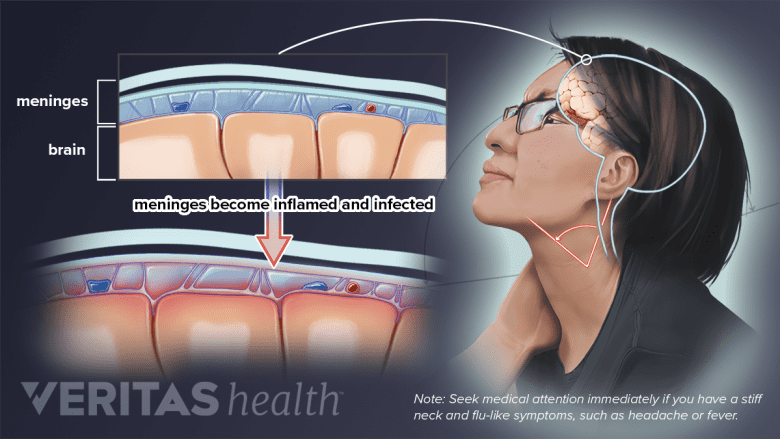A stiff neck can be annoying, but it is usually not cause for panic. In rare cases, however, it could signal the need for a prompt medical evaluation.
Red Flag Symptoms That Can Accompany a Stiff Neck
Stiff neck accompanied by a fever or headache may indicate a serious underlying condition.
If a stiff neck is the result of a condition other than a strain or sprain, oftentimes other symptoms will also be present. In such cases, typically at least one other symptom will develop with or before the stiff, painful neck occurs.1Bacterial meningitis. Centers for Disease Control and Prevention Website. https://www.cdc.gov/meningitis/about/bacterial-meningitis.html . Updated January 25, 2017. Accessed January 2, 2025.
In This Article:
- Stiff Neck Causes, Symptoms, and Treatment
- Treatment for a Stiff Neck
- When Is a Stiff Neck Serious?
- Stiff Neck Symptoms and Causes Animation
Below are “red flag” symptoms that could indicate a potentially serious underlying medical condition is causing the stiff neck:
- Fever, which likely signals an infection is being fought
- Headache, especially if it seems different from previous headaches in terms of duration, intensity, or accompanying symptoms
- Nausea or vomiting
- Fatigue or unexplained drowsiness
- Change in mental state, which could include confusion or mood swings
- Coordination issues, such as dizziness or problems walking or writing
- Weight loss that is not part of a diet change
See Understanding Neck Pain and Dizziness
These symptoms should motivate the individual to seek immediate medical attention, but they do not necessarily mean a serious condition or medical emergency is present.
Meningitis: The Most Common Serious Condition with Stiff Neck
Meningitis is a bacterial infection that causes the protective membranes of the brain and spinal cord to become inflamed.
Meningitis—which in its most dangerous form is a bacterial infection that causes the protective membranes of the brain and spinal cord to be inflamed—is the most common serious condition associated with a stiff neck.
According to the Centers for Disease Control and Prevention (CDC), a fever, headache, and stiff neck (inability to flex the neck forward, also called nuchal rigidity) are typically early symptoms of bacterial meningitis.1Bacterial meningitis. Centers for Disease Control and Prevention Website. https://www.cdc.gov/meningitis/about/bacterial-meningitis.html . Updated January 25, 2017. Accessed January 2, 2025. When any two of these symptoms are present together, they should be immediately checked out by a doctor.
Meningitis symptoms usually develop within a few days of exposure, and the individual’s condition could worsen gradually or rapidly. Early treatment for meningitis is critical for having a good outcome. Delayed treatment could result in poor outcomes, such as hearing loss, brain damage, or even death.
See When Neck Stiffness May Mean Meningitis
It should be noted that a stiff neck is not always present with meningitis, and other symptoms could include nausea, heightened sensitivity to light or loud noises, or confusion, among others.
Others Serious Conditions with Stiff Neck
Other conditions that would rarely cause stiff neck but require immediate medical attention include:
- Cervical dystonia. This neurological disorder, also known as a form of torticollis, can cause neck muscles to spasm uncontrollably. The head could be turned or stuck in various positions outside of normal alignment.
- Infection. While meningitis is the most common infection that could cause a stiff neck, numerous other infections could also result in a painful stiff neck.
- Tumor. A brain tumor, especially if it is located in the cerebellum, can cause a stiff neck. A tumor in the cervical spine, such as from cancer, could also cause the neck to become sore and/or stiff.
This is not a complete list, as many conditions could cause the neck tissues to swell or spasm, resulting in painful, restricted movement.
- 1 Bacterial meningitis. Centers for Disease Control and Prevention Website. https://www.cdc.gov/meningitis/about/bacterial-meningitis.html . Updated January 25, 2017. Accessed January 2, 2025.







